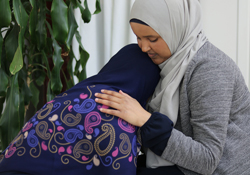Support for migrant women giving birth far from home

WHO
The increased risk of adverse pregnancy outcomes among migrant women has been well evidenced in research and reviews. Swedish midwives have taken action in response to evidence, and also to the need to improve experiences of care during pregnancy and birth among migrant women. In both Malmö and Halmstad, midwives have trained bilingual community-based doulas to support migrant women during pregnancy and childbirth.
Two key findings have been identified among migrant women – difficulties communicating and a lack of understanding of the health-care system in the host country. Bilingual doulas help lift both of these barriers.
Bilingual doulas build trust and confidence
A bilingual doula is trained to support women and their families during pregnancy, delivery and the first weeks after birth, in addition to care from a midwife. A doula is trained in anatomy, physiology, the birthing process, techniques for pain relief and ways to help with breathing and relaxation. She gives person-centred support, based on the needs and expectations of the couple, and she ensures clear communication with caregivers. She also provides continuity of care and can help families in other aspects of health and engagement with Swedish society.
According to midwives Maria Hogenäs and Anna Jensen, “Trust and confidence are keywords when giving birth. Support from a doula who speaks the same language makes women feel better. Empowered by a positive birth experience and the received care, migrant women are more likely to integrate into the wider community”.



